I have been giving a lot of thought to the future of this publication which I intend to share over the next week or so.
One thing in particular that is currently occupying my mind is figuring out the best way to share some of the rarer coffees that I am so fortunate to have access to.
Coffee is such a great connector of humans and the more I discover coffees of outstanding quality the deeper the urge is to share them. I often taste alone in my cupping space wishing someone was beside me to share in these unique sensory experiences. My desire to understand how we can unlock the flavour potential within this small seed is stronger than ever and I want to share the stories and celebrate the people who dedicate their lives to pushing coffee forward whilst rethinking and reshaping the way we communicate specialty coffee.
So, today I would like to thank you all with the gift of coffee.
To show my appreciation for you showing up and reading my thoughts each week I want to give you the opportunity to try some delicious coffee. As this year progresses I will be working on some exciting projects alongside some incredible human beings that I hope to document on this platform. The resulting outcomes will be of limited quantity and will not be intended for large-scale production (at least not yet) but, what I am hoping to achieve from this is the chance to gain a deeper understanding of what defines quality whilst working alongside the people who are committed to coffee’s future.
I have become obsessed with the nature of green coffee, how it is nurtured, cultivated and processed to produce this level of quality is an area that I would like to dedicate my time to as I move into this new chapter of my coffee career. My desire is to connect the people who are applying serious skill and innovation into their practices with the community of people who see the true value in this level of detail.
I feel a considerable amount of duty to share as much as I can about the complexities that go into producing quality coffee and I am hoping to play a small role in the development of these protocols. I also want everyone to have the opportunity to engage with the results and share their feedback.
I also want to thank you all for taking the time to read my rambles, it really is a pleasure to interact with so many of you each week.
Here’s how you get your hands on the free coffee sample.
It is pretty simple:
Make sure you are a subscriber of the Daily Tonic:
Just drop an email to; davidburtonsc@gmail.com with your name and address and I will get the coffee posted out this coming week.
I know some of you are based across the globe but this doesn’t matter. For this free sample of coffee, I am happy to front the bill on this one.
Coffee info.
What you will receive is a 1 x 100g sample of roasted coffee beans.
Prodcucer: Wilton Benitez.
Wilton Benitez is a highly specialised Colombian coffee producer, with over 12 years of experience in cultivating some of the world’s rarest coffee varieties. He currently owns and operates 3 naturally diverse coffee farms located in Piendamo –
Cauca in Southwestern Colombia at a height of 1800 – 2100 masl.La Macarena, 75 Hectares
Las Brisas, 22 Hectares
Granja Paraiso 92, 5 Hectares.Wilton comes from a family background in coffee production and started his coffee journey on the family farm, it was here that he discovered the true potential of coffee through fermentation technology. Wilton started to take a real interest in the way that fermentation practices were delivered in other industries such as wine,
and beer, to aid the development of new and unique flavour compounds, It was this level of understanding that inspired Wilton to create his own unique set of protocols and develop a philosophy to produce some of the world’s most desirable and exotic-tasting coffees.Finca El Paraíso-92 is a family farm that produces different varieties such as Java, Bourbon Pink, Geisha, Pacamara, Caturra, Tabi, Castillo, Supremo and Colombia. Using highly innovative cultivation systems such as terraces, drip irrigation, shade growing and nutrition calculations in the laboratory all aimed at producing a unique coffee that can be verified through the multiple awards obtained.
Finca Paraiso-92 also has its own microbiology laboratory, quality laboratory and processing plant. The processes applied to the different coffees start from a strict selection, sterilization and characterization of the cherry to later start with the first phase of controlled anaerobic fermentation, adding a specific microorganism for each process, then the coffee is pulped and subjected to a second fermentation phase when the second phase ends, a bean sealing process is carried out through the impacts of hot and cold water to improve the organoleptic conditions of the coffee.
Coffee Variety.
Orange Bourbon.
One of the most culturally and genetically important C. arabica varieties in the world, known for excellent quality in the cup at the highest altitudes.
Bourbon is the most famous of the Bourbon-descended varieties. It is a tall variety characterized by relatively low production, susceptibility to the major diseases, and excellent cup quality. French missionaries introduced Bourbon from Yemen to Bourbon Island (now La Réunion)—giving it the name it has today—in the early 1700s.
Until the mid-19th century, Bourbon did not leave the island. But beginning in the mid-1800s, the variety spread to new parts of the world as the missionaries moved to establish footholds in Africa and the Americas.
The Bourbon variety was introduced to Brazil around 1860, and from there rapidly spread north into other parts of South and Central America, where it is still cultivated today. Here it became mixed with other Bourbon-related varieties, introduced from India as well as Ethiopian landraces.
Nowadays, there are many Bourbon-like varieties found in East Africa, but none exactly match the distinct Bourbon variety that can be found in Latin America, and some areas of Colombia are seeing a reintroduction of this variety and its various natural mutations which are resulting in incredibly diverse and exceptional flavour profiles.
Coffee Processing.
Advanced technique.
1. Manual harvest/Selective picking.
2. Characterisation of the cherry.
3. Classification of the cherry by density and size.
4. Sterilisation of the cherry (with UV and Ozone).
5. First phase of cherry fermentation for 52 hours in bioreactors with a relief valve at a temperature of 18ºC.
6. During cherry fermentation, addition of specific yeast (Saccharomyces pastorianus) to enhance fruity notes.
7. Cherry pulping.
8. During cherry fermentation the mucilage is recovered. This is then added in to the second phase of fermentation after pulping.
9. Second phase of fermentation in mucilage for 48 hours at 21ºC
10. Washing of the grain with a thermal shock process (in order to fix the secondary aromas developed during the different fermentation phases), first: water at 40ºC and second: water at 12ºC.
11. Drying of the grain with controlled equipment for 48 hours at 38ºC
Importer.
Mi Cafe trading company.
Jonny Martinez has become a great friend of mine, we met at a coffee event just over a year ago and we have been learning from each other ever since. Jonny and his family come from a coffee producing background and are based in Medellin the second largest city in Colombia. Jonny moved to the UK 16 years ago studying and making his living as a structural engineer.
His love for coffee and his heritage has never wained and over the last few years Jonny has been working to re-establish some of his families land in the department of Antioquia Colombia to grow coffee once again. Whilst this coffee is being nutured for future harvests Jonny has been establishing connections with other producers in the country with Wilton being the main source of education and inspiration.
This has led to Jonny becoming the sole importer and distributor of Wilton’s expectional coffees in the UK and I currently find myself in the fortunate position of offering Jonny guidence on quality evaluations for some of the most innotive processes I have ever had the pleasure to grade.
The coffees produced are of limited quanitiy but exceptional quality and are currently gaining world wide recognition for their unique and complex flavour profiles. Many of the coffees that Wilton produces are being used by competition winners all over the globe.
Roasting.
HB-L2 Roaster
This was a tough little seed to crack, the high elevation and large screen size of this seed allowed me to throw some high energy at it from the start allowing adequate time to develop the roast whilst maintaining a relatively light to low medium colour reading. With a somewhat quick roast duration of just under 8 minutes this coffee has maintained some of it’s bright and fruity acidity which balances out really well with the heavy texture that comes from the results of this seeds large screen size. The resulting high level of moisture present at the start of this roast with the seed measuring at 11.3% of moisture allowed for excellent heat transfer throughout the roast and this shows in the complex range of aromatics that this coffee offers. The coffee has been allowed to rest for 4 weeks in a sealed airtight container allowing the coffee to mellow and provide an extremely fragrant and complex taste profile that is both balanced and bright.
Cupping evaluation.
Cup score 88.75
The coffee is clean and complex with vibrant citric acidity. The dry fragrance has subtle hints of grapefruit with lingering floral aromatics.
The texture is rich and incredibly juicy with a long sweet finish.
One of the sweetest coffees I have ever had the pleasure of tasting.
Ideal for filter brewing.
Photo by Luke Porter on Unsplash
Brewing.
V60 recipe.
Fresh filtered water (Recommended soft water around 75 - 100ppm)
16g of coffee medium to finely ground (EK43 dial 5)
280g water.
Total brew time 3 minutes 30 seconds.
Brewing times.
Add 50g of water straight off the boil for the initial bloom phase. Swirl to completely saturate the grounds. Leave to bloom for 45 seconds.
Add a further 130g of water after 45 seconds making sure the flow rate is stable. This should take you to 1 minute 20 seconds. Total volume should be 180g
At 1 minute 50 seconds add 100g of water. total volume should now be 280g. Swirl the brewer gently and allow the drawdown to empty. This should be completed within 3 minutes and 30 seconds. the coffee bed should be completely flat when fully drained.
The coffee should open up considerably as the temperature cools.
Enjoy.
For those of you who take the opportunity to try this coffee, I really do hope you enjoy it.
Please do not hesitate to drop me a line if you have any further questions.
I hope you are all having a great bank holiday.
I look forward to hearing your thoughts.
Cheers
Burts X


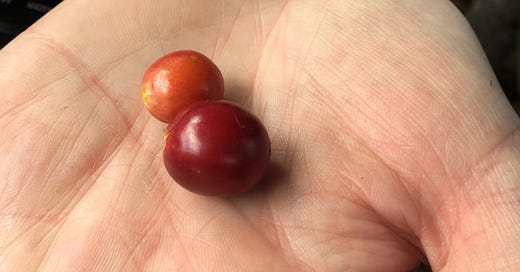



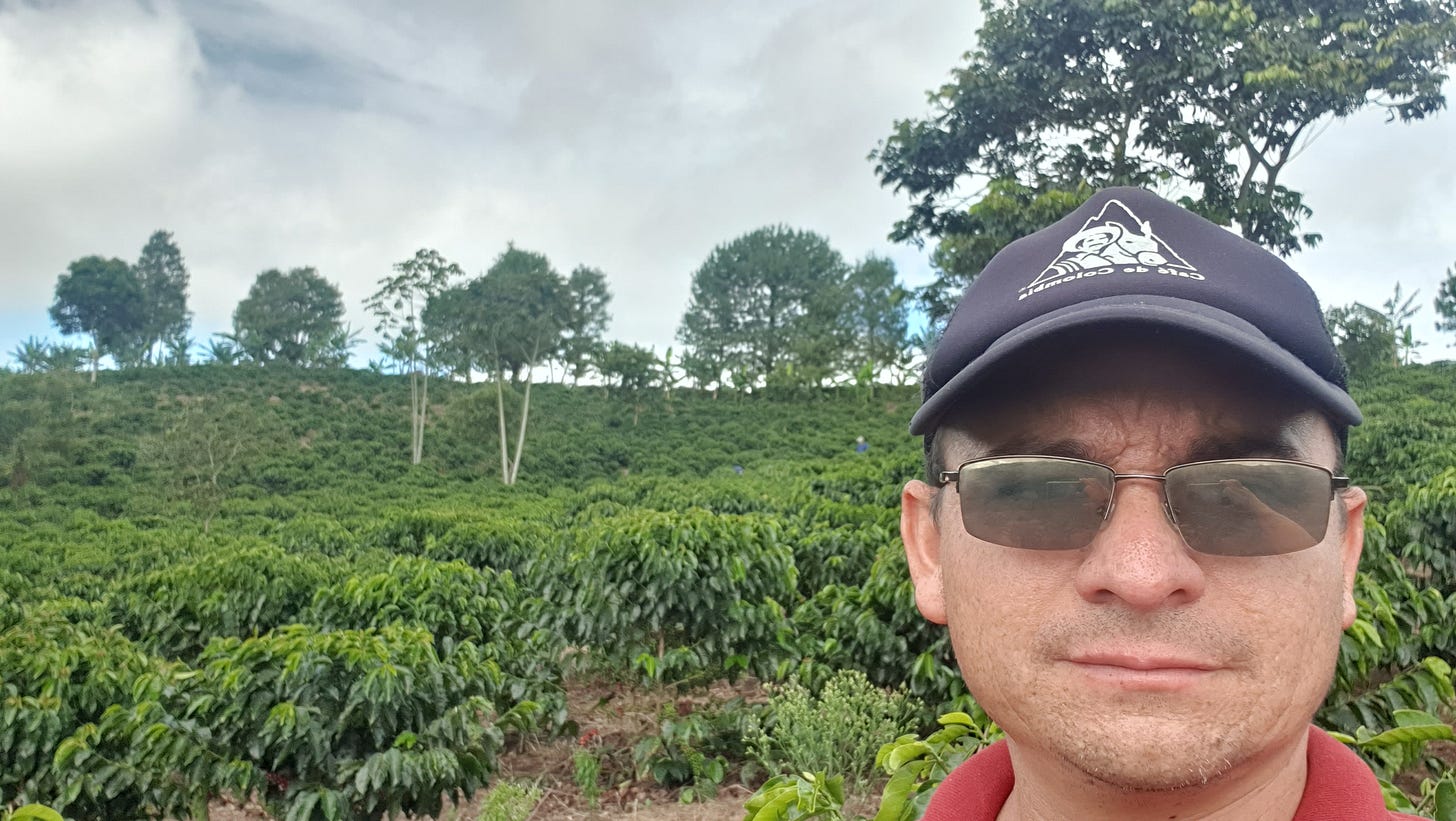
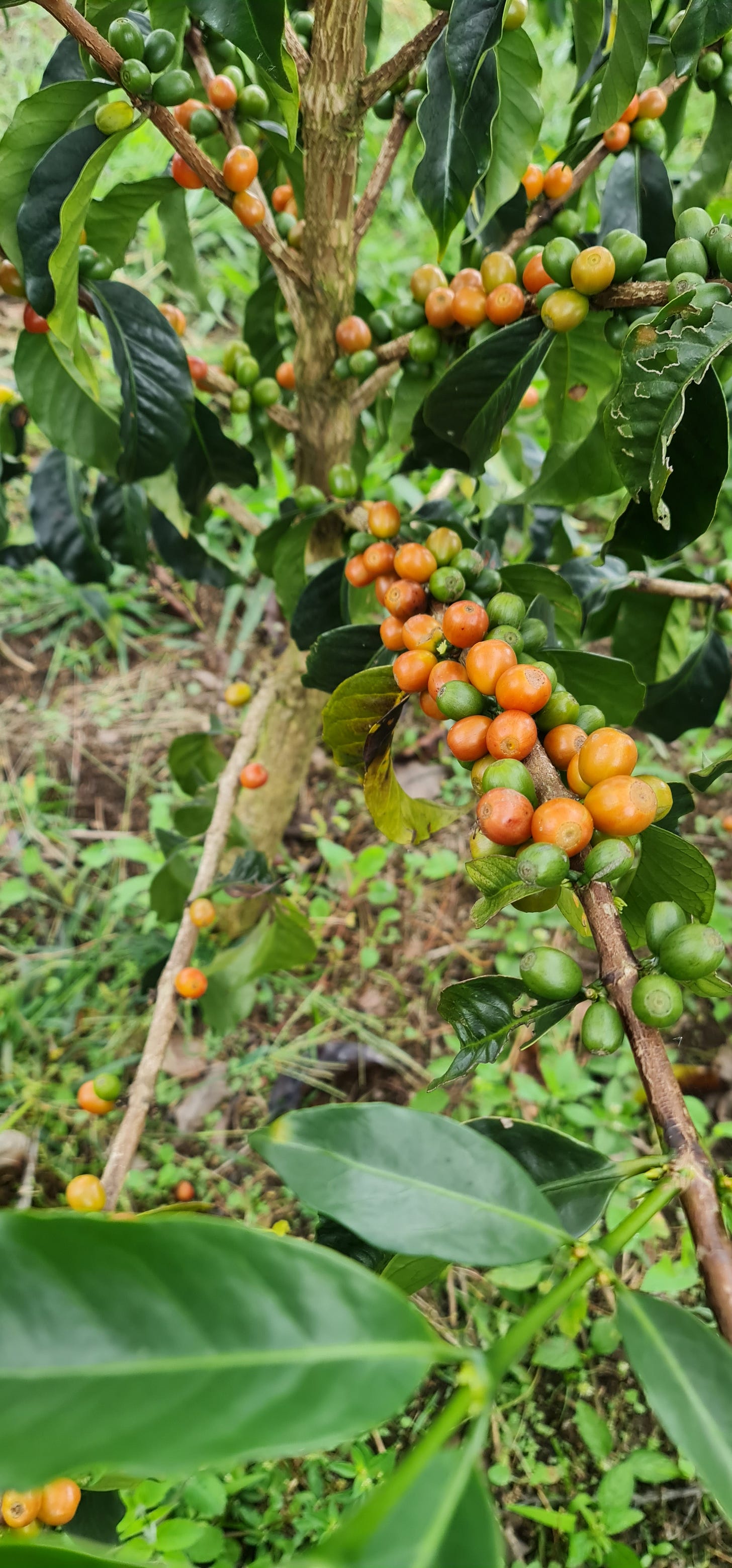
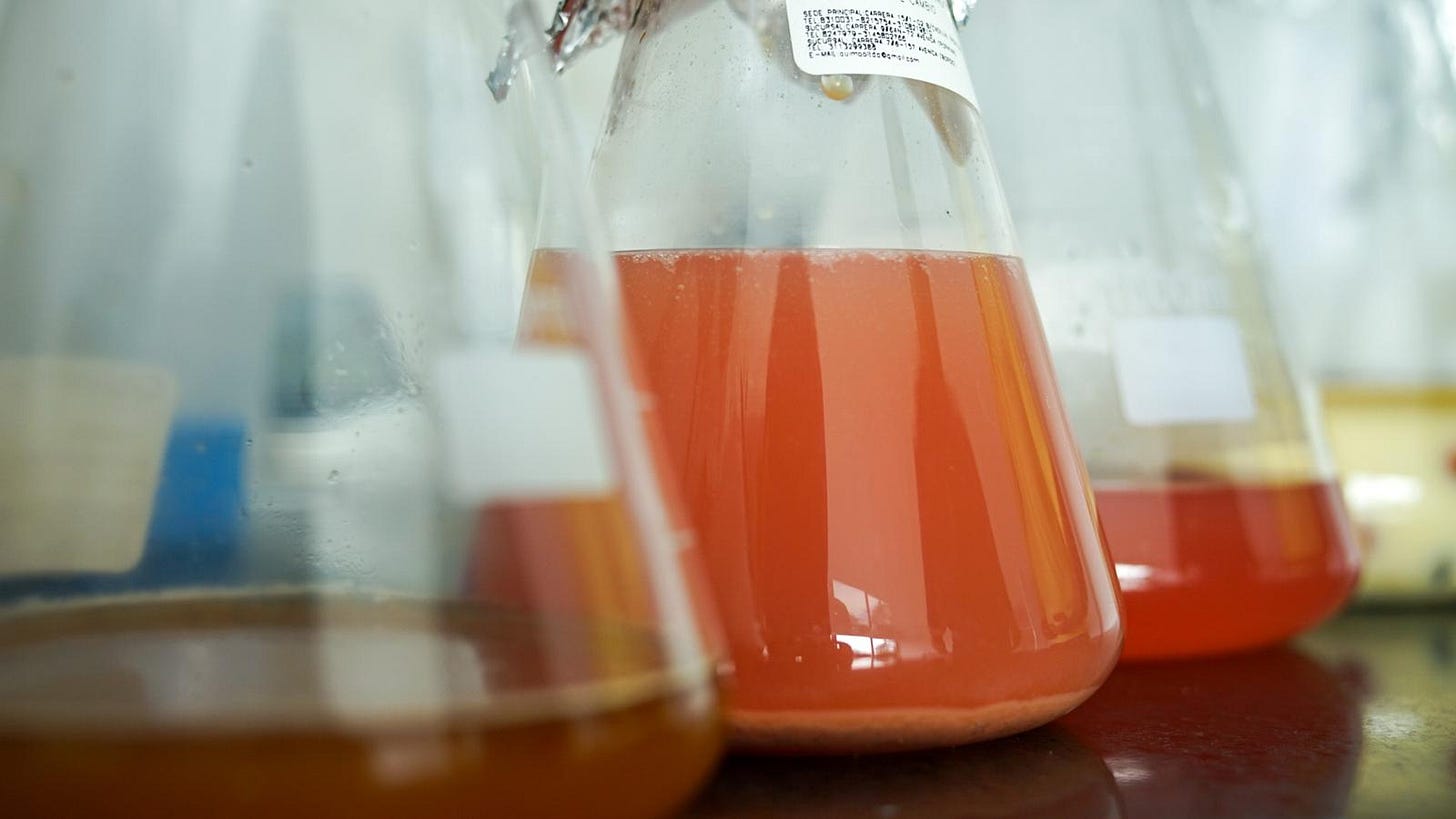
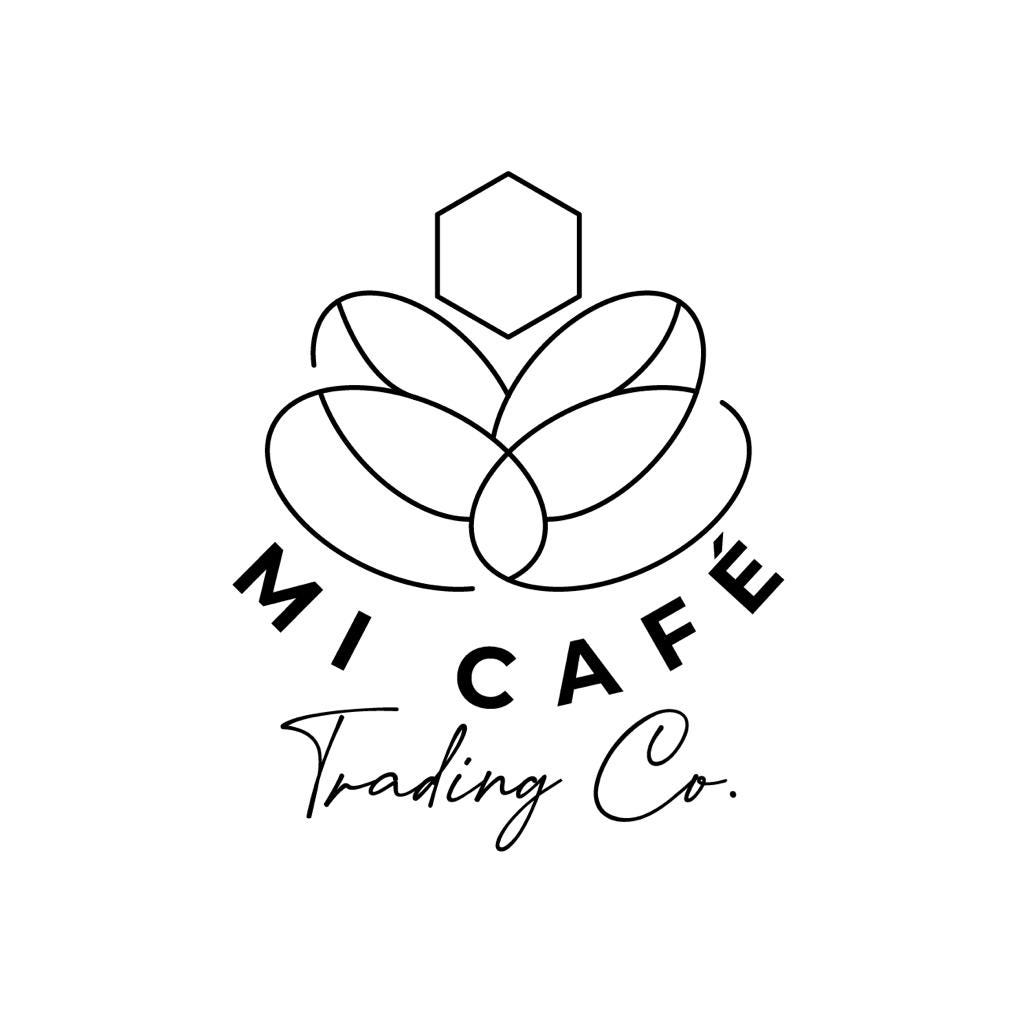




Hey David.
Quick return on the Colombian sample.
Oh my...
1st schnoz test...BOOZE!!!
2nd schnoz test (post-grind)...BOOZE!!!
3rd schnoz test (in cup, post aeropress)...beautiful delicate, sweet florals...
1st sip...very slight booze, but smooth, clean and sweet...
In short, finest coffee I've had in some time. Distinctive and easy too drink. My uneducated coffee guess would have been African. So surprised to find these notes in a Colombian coffee. A stunning brew.
Thank you so much...I'm off for another...
Best,
Colin.
Hey David. It's pretty tough getting noticed amongst the heavy traffic that is coffee world. Unless you're prepared for minor YouToob celebrity status, plain old factual, discussive content, is left to those of us determined, avid, knowledge gathering readers...perhaps like moi, of a certain vintage! That said, the content of your Tonic, is never anything less than fascinating and your enthusiasm for what you do and what you'd like to do, is never in doubt. Personally, I migrate towards people like yourself, who are experts in their field and coupled with unbridled enthusiasm, it's a highly potent mix. Anyhoo, I do look forward to that very generous coffee offer. I rest assured, if it passes your excellence test, it will be a fine experience...